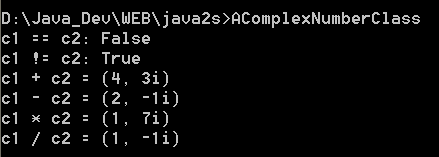A Complex Number Class

/*
A Programmer's Introduction to C# (Second Edition)
by Eric Gunnerson
Publisher: Apress L.P.
ISBN: 1-893115-62-3
*/
// 25 - Operator Overloading\A Complex Number Class
// copyright 2000 Eric Gunnerson
using System;
struct Complex
{
float real;
float imaginary;
public Complex(float real, float imaginary)
{
this.real = real;
this.imaginary = imaginary;
}
public float Real
{
get
{
return(real);
}
set
{
real = value;
}
}
public float Imaginary
{
get
{
return(imaginary);
}
set
{
imaginary = value;
}
}
public override string ToString()
{
return(String.Format("({0}, {1}i)", real, imaginary));
}
public static bool operator==(Complex c1, Complex c2)
{
if ((c1.real == c2.real) &&
(c1.imaginary == c2.imaginary))
return(true);
else
return(false);
}
public static bool operator!=(Complex c1, Complex c2)
{
return(!(c1 == c2));
}
public override bool Equals(object o2)
{
Complex c2 = (Complex) o2;
return(this == c2);
}
public override int GetHashCode()
{
return(real.GetHashCode() ^ imaginary.GetHashCode());
}
public static Complex operator+(Complex c1, Complex c2)
{
return(new Complex(c1.real + c2.real, c1.imaginary + c2.imaginary));
}
public static Complex operator-(Complex c1, Complex c2)
{
return(new Complex(c1.real - c2.real, c1.imaginary - c2.imaginary));
}
// product of two complex numbers
public static Complex operator*(Complex c1, Complex c2)
{
return(new Complex(c1.real * c2.real - c1.imaginary * c2.imaginary,
c1.real * c2.imaginary + c2.real * c1.imaginary));
}
// quotient of two complex numbers
public static Complex operator/(Complex c1, Complex c2)
{
if ((c2.real == 0.0f) &&
(c2.imaginary == 0.0f))
throw new DivideByZeroException("Can't divide by zero Complex number");
float newReal =
(c1.real * c2.real + c1.imaginary * c2.imaginary) /
(c2.real * c2.real + c2.imaginary * c2.imaginary);
float newImaginary =
(c2.real * c1.imaginary - c1.real * c2.imaginary) /
(c2.real * c2.real + c2.imaginary * c2.imaginary);
return(new Complex(newReal, newImaginary));
}
// non-operator versions for other languages
public static Complex Add(Complex c1, Complex c2)
{
return(c1 + c2);
}
public static Complex Subtract(Complex c1, Complex c2)
{
return(c1 - c2);
}
public static Complex Multiply(Complex c1, Complex c2)
{
return(c1 * c2);
}
public static Complex Divide(Complex c1, Complex c2)
{
return(c1 / c2);
}
}
public class AComplexNumberClass
{
public static void Main()
{
Complex c1 = new Complex(3, 1);
Complex c2 = new Complex(1, 2);
Console.WriteLine("c1 == c2: {0}", c1 == c2);
Console.WriteLine("c1 != c2: {0}", c1 != c2);
Console.WriteLine("c1 + c2 = {0}", c1 + c2);
Console.WriteLine("c1 - c2 = {0}", c1 - c2);
Console.WriteLine("c1 * c2 = {0}", c1 * c2);
Console.WriteLine("c1 / c2 = {0}", c1 / c2);
}
}
Related examples in the same category